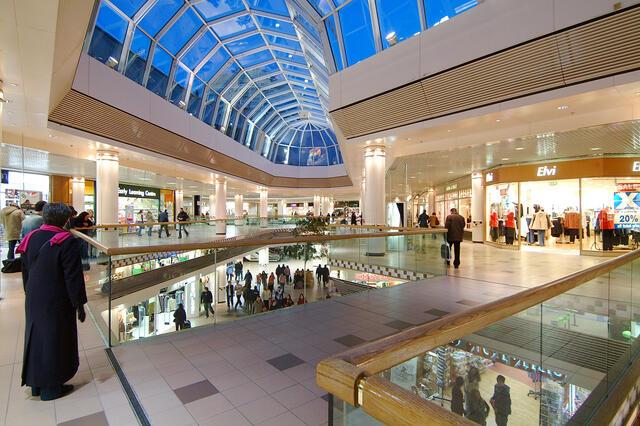Land Securities' AHU Refurbishment at Bon Accord
01 January 2013Land Securities' AHU Refurbishment at Bon Accord
01 January 2013At Bon Accord shopping centre in Aberdeen, Land Securities has refurbished and improved air handling units. This has contributed to almost £50,000 of annual energy cost savings and an 80% reduction in energy use for heating and ventilation in common parts.
Key Facts
- £49,700 annual savings
- 139 tonnes of co2 emissions saved
- 80% less fan motor electricity demand in common parts
Situation
As the UK’s largest commercial property company, Land Securities recognises the need to reduce the impacts of its property portfolio. The company aims to reduce CO2 emissions from its managed properties by 30% by 2020, compared to 2000/01. To achieve this, the company has developed site-specific environmental management plans for every shopping centre.
Bon Accord & St Nicholas offer 750,000 sq ft of retail space in the heart of Aberdeen, featuring over 60 stores and attracting 15 million visits each year. Land Securities has asset management responsibility for the centres, which are owned in a joint venture between Land Securities and British Land. Originally
constructed in 1990, Bon Accord benefited from a £6 million refurbishment programme in 2011.
Land Securities commissioned Wallace Whittle Consulting Engineers to complete a feasibility review of CO2 reduction opportunities, which included:
- Modifying air handling units (AHUs)
- Replacing hot and cold and condensing water pumps
- Installing heat pumps
- Retrofitting a combined heat and power (CHP) system.
Actions
Modifying AHUs, combined with lifecycle replacement of AHU components, presented the optimum investment opportunity in terms of payback, CO2 reductions and increased lifespan for major plant.
AHUs condition and circulate air for heating, cooling and air conditioning, helping to provide a pleasant environment for shoppers, staff and visitors to the centre, by ensuring that the air they breathe offers the correct temperature and level of CO2.
Before undertaking the main works, Land Securities installed an automatic meter reading (AMR) system, iMAT. The system provides an online software package, which automatically collects and analyses meter readings and other data, such as individual motor run times and power consumption, through the building management system.
This enables the team to proactively identify and implement energy saving opportunities on an ongoing basis, by accessing energy data online and comparing actual usage against expected usage, generating exception reports and identifying unnecessary consumption. It also means the team can accurately monitor consumption before and after plant modifications. There is also the option to add recharge metering for occupiers, if required.
As part of the plant replacement programme, Land Securities:
- Commissioned a full inspection of each AHU by the manufacturer. A detailed report identified where repairs were needed and/or components needed to be replaced due to age, corrosion or obsolescence
- Removed unused cooling fan coils from the existing AHU to improve fan power by removing internal air resistances
- Installed inverter-controlled, variable-speed drives on the fans. These regulate the speed of the fans by controlling power into the motor, rather than constantly running the motor at full speed and restricting the fans
- Retrofitted automatic volume-control dampers to constantly regulate the airflow in the AHU. Previously, all ventilation operated at 100%. Through demand control ventilation, the building management system adjusts the speed of the fans if CO2 reaches a pre-determined level at peak times.
Benefits
Savings achieved
- 80% less fan motor electricity demand in common parts, saving 330,560 kWh and 139 tonnes of CO2 emissions.
Based on iMAT metering since April 2011, compared to the previous year.
Forecast additional savings
- 80% less heating demand in common parts (gas), saving 400,000 kWh and 80 tonnes of CO2 emissions
- 50% less electricity and heating demand in occupier areas, saving 273,300 kWh and 84 tonnes of CO2 emissions.
Based on design predictions.
Other benefits
- Addressing plant dilapidation issues
- Adding 15 years life expectancy to the heating and ventilation systems for common parts and occupier areas.
Financials
Overview*
- Capital investment in metering and enhancements: £250,000
- Annual savings: £49,700
- Payback period: five years.
Savings achieved
- Less fan motor electricity demand in common parts: £23,700.
Forecast additional savings
- Less heating demand in common parts: £12,000
- Less electricity and heating demand in occupier areas: £14,000.
The capital investment was funded through ongoing service charge collections towards a plant replacement provision fund, from 1992 onwards.
*Savings based on Land Securities’ average rates for electricity and gas.
Challenges and Achievements
TRADING
How to carry out the plant replacements without affecting retailers’ trading?
Land Securities places a priority on providing retailers with the environments they need to trade successfully, at the same time as giving shoppers a great retail and leisure experience. At Bon Accord, the vast majority of work took place at night so there was minimal disruption to retailers and shoppers.
AIR QUALITY
How to cut energy use for air handling whilst maintaining air quality?
The variable footfall patterns in the centre offered significant opportunities to reduce fresh air supply volumes during off-peak periods. Land Securities programmed the building management system to adjust AHU settings to match footfall profiles. Monitoring shows that demand control ventilation has not resulted in any significant increase in CO2 levels, compared to 100% ventilation.
MAINTAIN SAVINGS
How to maintain energy savings for air handling?
The on-site team continues to monitor CO2 levels, particularly at peak times and during busy periods such as Christmas.
The team is also keeping an eye open for any changes in patterns of footfall, for instance with different areas of the centre becoming busier, so that they can adjust settings accordingly. They are not using the CO2 sensors to directly control the AHU, as the time delay would mean that fans would activate after people had left the centre.
Find out more
Neil Pennell
Head of Engineering and Design
Land Securities
www.landsecurities.com
*Please note that the information on this page was supplied by the BBP Member and the BBP assumes no responsibility or liability for any errors or omissions in the content

